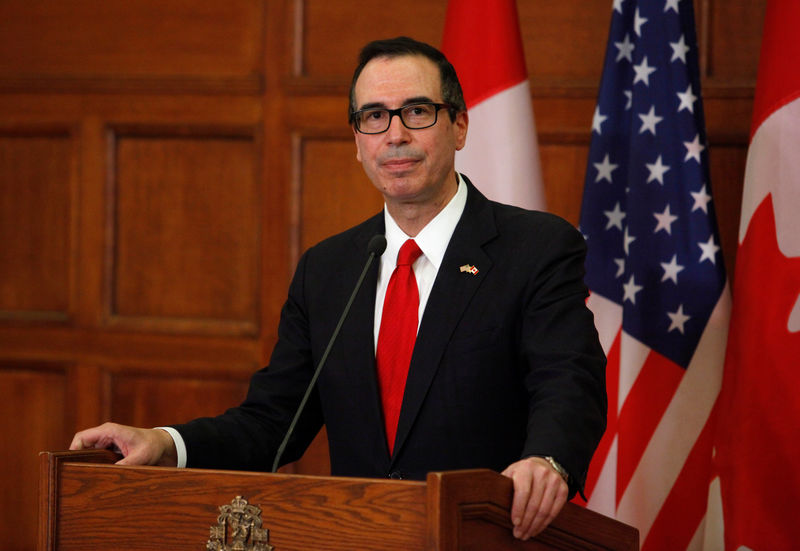By Lindsay Dunsmuir and Leah Schnurr
OTTAWA (Reuters) - U.S. Treasury Secretary Steven Mnuchin on Friday said he was not worried by lower-than-expected tax revenues, saying that he has a backup plan for funding government if Congress did not raise the debt ceiling by August.
Government tax receipts for early 2017 were 3 percent lower than expected, the nonpartisan Congressional Budget Office said in a May 5 report.
"Receipts are coming in somewhat lower, and I think that's in expectation of that we're going to do tax reform," Mnuchin told a news conference in Ottawa, the Canadian capital, where he met with Canadian Finance Minister Bill Morneau.
"I've been consistent in (saying) we hope Congress deals with the debt limit as soon as possible, but in any event, we're not concerned," he added.
The weaker tax revenues have forced the Treasury to borrow more money than expected to cover the federal budget deficit, which is putting the government on track to hit its legal debt limit sooner than it forecast, experts say.
Mnuchin wants lawmakers to raise Washington's borrowing limit before they break for a long recess in August.
Asked what would happen if Congress did not act before then, he replied: "We will be fine if they (Congress) don't do it beforehand. ... We have plans and back-up plans for funding the government."
Pressed as to what he had in mind, Mnuchin said: "They are Treasury secretary superpowers."
President Donald Trump has made tax reform one of his biggest priorities. He has proposed cutting the corporate income tax to 15 percent, down from the current top corporate rate of 35 percent, though because of loopholes few multinational companies pay that rate.
"Nothing is higher on my priority list than getting tax reform done this year. ... It is critical for economic growth," Mnuchin said.
Some Canadian politicians and business leaders are concerned that if Trump cuts corporate taxes, it could make companies north of the border less competitive.
"As the U.S. moves forward with their plans, we'll make sure we understand them well to ensure our tax system stays appropriate," said Morneau, who gave no further details.
Morneau said he and Mnuchin also spoke about lumber and trade. Canada softwood lumber exports have emerged as a trade irritant ahead of talks to renegotiate the North American Free Trade Agreement.

Washington in April imposed preliminary anti-subsidy duties averaging 20 percent on imports of Canadian softwood lumber.